Author: dorner
Event: $1 BOOK SALE
Saturday, April 21
9am – 3pm
303 Doe LibraryThe 4,500+ books on the shelves of 303 Doe will be offered for $1 each. Most books are fresh – that is, they have not been offered for sale before. You will find some surprisingly attractive books in the room. I hope that many move from the Library’s shelves to yours.
The Doe Library building will open at 9am on the day of the sale. The best place to wait, if you plan to arrive in advance, is at the main (North) entrance to Doe. Right at 9am I’ll walk up to room 303 with those who have been waiting in line. I’ll ask that everyone maintains his or her place in the line.Scanners are permitted for those who require an electronic second opinion. Hoarding books for subsequent leisurely review, however, is not.
Thank you for your interest, and we hope to see you there,
Dirk Kennedy
Primary Sources: The Guatemala Collection: Government and Church Documents for Sacatepéquez
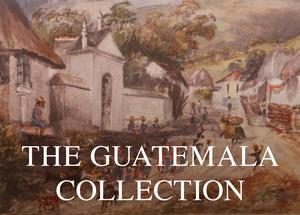 The Library has acquired the The Guatemala Collection: Government and Church Documents for Sacatepéquez (1587-1991).
The Library has acquired the The Guatemala Collection: Government and Church Documents for Sacatepéquez (1587-1991).
Populated predominantly by indígenas (indigenous peoples) who speak Kaqchikel-Maya, Sacatepéquez Department offers an excellent window into Latin American and Native American history. Crucial to Guatemala’s colonial and national development, indígenas were largely discounted and denigrated. Despite such discrimination and disadvantages, many found ways to survive and thrive. Often converging at the nexus of modernization and tradition, the documents in this collection convey the complicated hybrid history of a nation striving to present itself as progressive and civilized in an Atlantic world that seldom associated those qualities with indigeneity. The Guatemala Collection houses a rich array of government, church, and civil documents that bear testimony to an indigenous population’s struggle and success with the changing social, economic, political, and religious dynamics of colonial and independent rule.
The Guatemala Collection comprises ten series. Across these ten series, the documents of the collection are organized into fifty-seven distinct classifications that include such themes as economy, agriculture, forced labor, complaints, crime, annual reports, natural disasters, municipal affairs, education, elections, military, public works, religion, public health, lands and estates, development, resignations and solicitations, regulations, festivities, and maps.
Language: Spanish
Primary Sources: Los Primeros Libros de las Americas
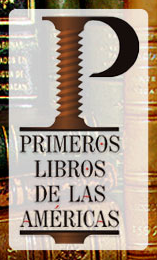 As the site explains, Los Primeros Libros de las Americas is “a digital collection of the first books printed in the Americas before 1601. These monographs are very important because they represent the first printing in the New World and provide primary sources for scholarly studies in a variety of academic fields. Of the 220 editions believed to have been produced in Mexico and 20 in Peru, approximately 155 are represented in institutions around the world.”
As the site explains, Los Primeros Libros de las Americas is “a digital collection of the first books printed in the Americas before 1601. These monographs are very important because they represent the first printing in the New World and provide primary sources for scholarly studies in a variety of academic fields. Of the 220 editions believed to have been produced in Mexico and 20 in Peru, approximately 155 are represented in institutions around the world.”
Resource: New Research Guide for France’s May ’68
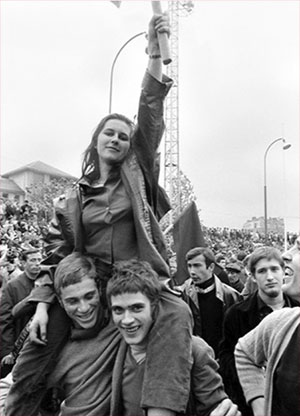 Les événements de mai 68 (the events of May ’68) or Mai 68 (May ’68) refer to the socio-political and cultural contestation that took place in France between May and June, 1968. Student protests at universities in Nantes, Brest and Nanterre were eventually joined by a general strike involving some 10 million workers, nearly 20 percent of the population. While the movement, or events, which lasted nearly 6 weeks failed to transform the state, it did have an indelible impact on French society, forever changing the social space and opening up a terrain for new social movements.
Les événements de mai 68 (the events of May ’68) or Mai 68 (May ’68) refer to the socio-political and cultural contestation that took place in France between May and June, 1968. Student protests at universities in Nantes, Brest and Nanterre were eventually joined by a general strike involving some 10 million workers, nearly 20 percent of the population. While the movement, or events, which lasted nearly 6 weeks failed to transform the state, it did have an indelible impact on French society, forever changing the social space and opening up a terrain for new social movements.
As May ’68 approaches its fiftieth anniversary, the Mai 68: Library Research Guide created by Claude Potts, Librarian for Romance Language Collections, serves as a starting point for interdisciplinary research of all levels into this specific historical moment and also commemorates the ways the movement opened up a broader discourse into social emancipation, including feminism, anti-racism, ecology, and gay rights. As home to the Free Speech Movement and the first large-scale protest against the Vietnam War in 1964, UC Berkeley has a special connection with May ’68, and the depth of our library collection on the topic is a testament to that transatlantic link.
(Photo by Bruno Barbey of students and workers in Charlety stadium in Paris. May 27th, 1968 retrieved from ARTstor.)
Primary Sources: British Labour Party papers, 1906-1969
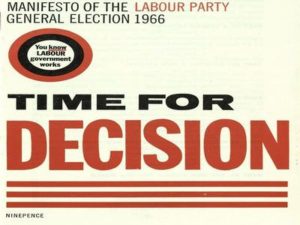 The Library has acquired British Labour Party papers, 1906-1969, a module on the British Online Archives platform.
The Library has acquired British Labour Party papers, 1906-1969, a module on the British Online Archives platform.
These papers cover the foundation of the Parliamentary Labour Party in 1906, then “follow the Party through Ramsay MacDonald’s Governments, two world wars, the first Harold Wilson Government and the early part of his second Government. The events in these records are a reflection of current events as much as of the Party itself. From the suffrage campaign for the electoral enfranchisement of women, to nuclear tests over the Pacific Ocean, through the Beveridge Report, the Trade Union Bill and the development of the United Nations. Early policies like the minimum wage would not pass for decades and Party discipline would be a challenge for every Party Leader. Those challenges existed alongside the removal of the right for employers to sue trade unions and the creation of social services. These papers have been arranged by year and divided into thematic groups for ease of analysis.”
Event: Bancroft Roundtable: California’s Place in Anti-Slavery Litigation on the Eve of the Civil War
The second Bancroft Library Roundtable talk of the spring semester will take place in the Lewis-Latimer Room of The Faculty Club at noon on Thursday, March 15. Alexandra Havrylyshyn, J.D. and Ph.D. candidate in Jurisprudence and Social Policy at UC Berkeley and Bancroft Library Study Award recipient, will present “California’s Place in Anti-Slavery Litigation on the Eve of the Civil War.”
__________________________________________________________
Between 1846 and 1851 New Orleans trial judge John McHenry ruled in favor of nearly twenty enslaved petitioners who sought freedom on the basis of having touched free soil. These rulings directly contravened Louisiana state legislation, but McHenry reasoned that they were in keeping with higher sources of law: constitutional, federal, and international. He migrated to California, and his personal and legal papers are now preserved in The Bancroft Library. Havrylyshyn’s presentation will explore McHenry’s political identification and the ways that anti-slavery litigation influenced California before the start of the Civil War.
We hope to see you there.
José Adrián Barragán-Álvarez and Kathi Neal
Bancroft Library Staff
Trial: John Johnson Collection: An Archive of Printed Ephemera
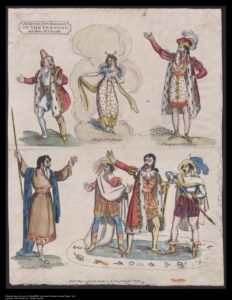 Until April 1, the Library has trial access to the John Johnson Collection, An Archive of Printed Ephemera. This resource provides high-quality images of thousands of items selected from the John Johnson Collection of Printed Ephemera housed at the Bodleian Library in Oxford, England. The collection offers “unique insights into the changing nature of everyday life in Britain in the eighteenth, nineteenth, and twentieth centuries. Categories include Nineteenth-Century Entertainment, the Booktrade, Popular Prints, Crimes, Murders and Executions, and Advertising.”
Until April 1, the Library has trial access to the John Johnson Collection, An Archive of Printed Ephemera. This resource provides high-quality images of thousands of items selected from the John Johnson Collection of Printed Ephemera housed at the Bodleian Library in Oxford, England. The collection offers “unique insights into the changing nature of everyday life in Britain in the eighteenth, nineteenth, and twentieth centuries. Categories include Nineteenth-Century Entertainment, the Booktrade, Popular Prints, Crimes, Murders and Executions, and Advertising.”
Event: Opening of Library Exhibit ” “Vida y Resistencia en el Territorio Mapuche, Chile”
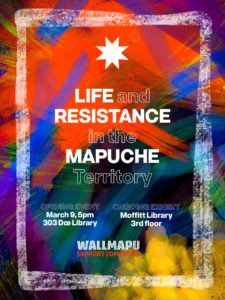 This Friday, March 9, the Library will open an exhibit co-sponsored by the CLAS working group, the Wallmapu Support Committee. “Vida y Resistencia en el Territorio Mapuche, Chile” (Life and Resistance in the Mapuche Territory) can be viewed on the 3rd floor of Moffitt Library from March 9 – June 30, 2018.
This Friday, March 9, the Library will open an exhibit co-sponsored by the CLAS working group, the Wallmapu Support Committee. “Vida y Resistencia en el Territorio Mapuche, Chile” (Life and Resistance in the Mapuche Territory) can be viewed on the 3rd floor of Moffitt Library from March 9 – June 30, 2018.
The opening event is scheduled Friday from 5 pm – 6:30 pm in 303 Doe Library. There will be a short musical performance and some presentations by Chilean and Mapuche community members from the Bay Area.
Event: Maps and More: Mapping Indigenous California History
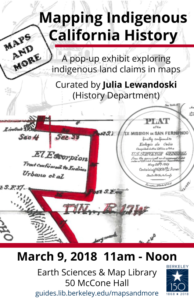
Friday, March 9 | 11 AM – Noon
Earth Sciences & Map Library
50 McCone Hall
Guest curated by Julia Lewandoski, History Department graduate student
This event explores just one chapter in California’s complex and on-going indigenous history, by featuring maps of Native American land claims made in the 1850s. After the 1830s secularization of the Spanish Franciscan missions where many Native Californians were forced to live and labor, some Native peoples still living at former missions managed to obtain titles to land from Mexican authorities. After the U.S. conquest of California in 1848, these proprietors had to claim their land again, this time to U.S. officials. Alongside broader maps that show California’s rich indigenous past and present, these land claim maps tell a story of indigenous resilience in the aftermath of the mission system and in the face of U.S. conquest.
Event: Anthropocene: March’s Movie at Moffitt
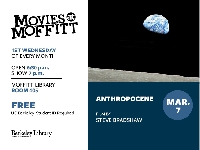 Film – Documentary | March 7 | 7-9 p.m. | 405 Moffitt Undergraduate Library
Film – Documentary | March 7 | 7-9 p.m. | 405 Moffitt Undergraduate Library
A Working Group of international scientists is deciding whether to declare a new geological epoch — the Anthropocene — with the Earth shaped more by mankind than nature. Its members tell the story of the Anthropocene and argue whether it’s a tragedy, a comedy, or something more surreal. With archival footage, award-winning stills and interviews, [the film] proposes a common secular narrative for mankind but leaves viewers to decide how we should write the ending.
Open to audiences: Graduate & Undergraduate Students
Must have a UCB student ID for entrance.
Event Contact: 510-642-3217